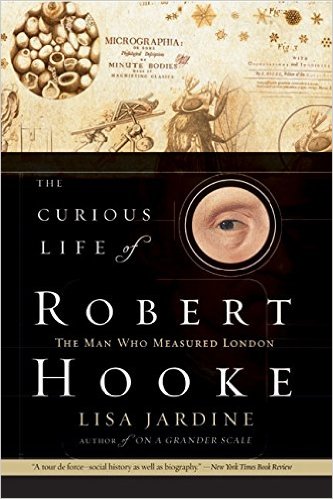The Curious Life of Robert Hooke was first published in 2003, but I received my paperback copy on 26 May 2006 – I can remember the day because it was my sister’s birthday, the last day of my final exams at university, and because the book was too late: I had already written the essay on Hooke’s Micrographia that I’d bought it for. It wasn’t any use for revision and so I read it slowly, starting towards the end with Hooke’s death.
Lisa Jardine’s version of Hooke’s progress sees him transform from a lonely boy with few financial or intellectual resources, playing on his own on the Isle of Wight, to a wealthy, gregarious and eminent natural philosopher in London. Her Hooke is dedicated to investigating the nature of things, tireless and odd. He examines his own urine under the microscope, he gets an ant drunk so that he can take a better look at it, he scraps with Sir Isaac Newton about intellectual property, he suffocates himself in a man-sized air-conditioning unit of his own design, he has an affair with his teenage niece, he designs wings. She quotes his contemporary Henry Oldenburg who called him ‘a man of unusual humour’.
Hooke’s character carries unusually well through historical documents. It was easy for me to recognise how difficult he was: his meanness, his tendency to overwork and to take his frustration out on those around him; his self-absorption; his insularity; his readiness to take offence and his quick temper. I liked him immediately. At the same time I admired his sharp intelligence, his creative mathematical and mechanical thought, his charity, the way he kept faith with so many occupations, the kindness he showed (which was more admirable because it was effortful), and his firm and unexamined belief that he could improve the world through an adventurous programme of work. The Curious Life of Robert Hooke is itself curious in the sense of inquisitive and peculiar, and in the older sense that was more prevalent during Hooke’s lifetime – precise, rigorous, ingenious.

Years later, after Lisa had supervised my PhD on Hooke andhis peers, we were talking about how she had been rereading his papers while researching a radio programme. She found to her surprise that she was still interested in him. ‘It doesn’t go away’, she said. ‘He’s still just the same – just as . . .’ she couldn’t find exactly the right word. Both Hooke and Lisa seem somehow inexhaustible to me, and when Lisa died a few months ago, I wanted to go back to it.






